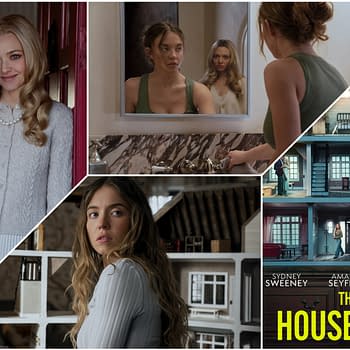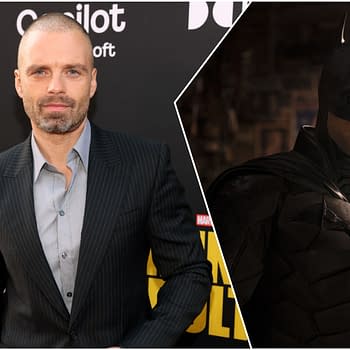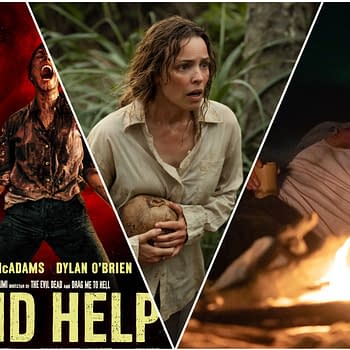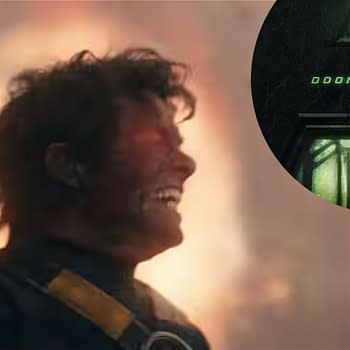Posted in: Movies, Recent Updates | Tagged: act of faith, Alan Moore, Andrew Buckley, Darrell D'Silva, electricomics, entertainment, film, his heavy heart, jimmy's end, kickstarter, mitch jenkins, show pieces, Siobhan Hewlett, The Leeds International Film Festival, the show, thought bubble, tv
Alan Moore And Mitch Jenkins' Show Pieces Proves Its Mettle At The Leeds Film Festival – Plus Q And A With Moore, Jenkins, And Cast
The Leeds International Film Festival was the second stop for Show Pieces at film festivals, having debuted at the London Fright Fest. Show Pieces consists of three parts of the five piece short film series written by Alan Moore and directed by Mitch Jenkins. While Show Pieces as screened at the festival includes Act of Faith, Jimmy's End, and His Heavy Heart, the wider film cycle actually also includes the shorts Upon Reflection and A Professional Relationship.
The version of Show Pieces being screened tonight in Leeds, however, also reflects the ambition of the bigger project known as The Show, a wider film narrative set within a "Nighthampton" world where Northampton goes when it dreams, or when a town dies. Moore and Jenkins have two developing possibilities regarding The Show: to make it either a feature film and afterwards, a TV series, or to simply make it a TV series. Both options are being explored at the moment, as Jenkins explained after the screening in a Q & A.
Though I was a backer of the Kickstarter that funded the final film in the Show Pieces series, His Heavy Heart, and therefore have seen the digital versions of all 5 shorts, seeing this selection of films as a complete piece on a large screen in Leeds Town Hall was in many ways a very different experience for me. Rather than viewing the films episodically, I encountered them as a fused narrative and was struck finally by how seamlessly the narrative actually progresses without anything more than title cards to separate the three parts of the festival version. I ventured to say quite awhile ago that I saw no reason why Show Pieces wouldn't make an excellent feature film based particularly on the strength of the longer episode, Jimmy's End, but now I had a chance to see the film prove it's mettle as a realized first step toward that goal. And it did prove its mettle, in some ways I expected it to, but in many ways I didn't see coming, even though I had the mind-bending experience of visiting the set of His Heavy Heart while it was being filmed in Northampton last January.
One of the aspects of my experience that particularly struck me was the absolute dynamism of the acting in the films. Siobhan Hewlett as Faith and Darrell D'Silva as James totally dominated the large, packed venue of filmgoers in Leeds with a force that impacted me in different ways on a small screen. To go a step further, these two are more than capable of handling the big screen format.
But I'd be remiss if I left out Andrew Buckley in my praise, who inhabits the character Bubbles the Clown in the series. Buckley takes over significant screen time in Jimmy's End and even more radically so in His Heavy Heart, and his astonishing range of rage, dread, and humor had the audience laughing out loud, all while no doubt finding him a little scary despite themselves.
Most film critics would agree that feature films place that extra demand on the presence actors can project, and Show Pieces is already well on its way in that respect. Another thing that struck me seeing the big screen version was the visual iconography of pop culture, afterlife mythologies, and a unique visual language developed by Jenkins and Moore specifically for this film. These were teased out and discussed in part when the short films were released by many viewers, since they are an obvious calling card of the films, but when you see Show Pieces as a single narrative, you notice new connections aesthetically and conceptually that were present but you might have overlooked to begin with.
The only way that these connections could actually play out even better on a large screen shown in sequence, to my mind, is if the films had been planned even more intricately than I had initially expected. You may see a repeating pattern in nature, for instance, and be impressed by its symmetry, but when the intricacy becomes even more mind-boggling under a microscope, you know that a thing has deep structure. Show Pieces shines out through deep structure in this format.
It would be a suitable and no doubt very influential thing if Show Pieces does become a feature film known as The Show so that viewers can experience the world of Nighthampton through this particularly interesting lens, and the materials in place certainly have the mettle to do that, but if it also becomes a TV show, or perhaps solely a TV show, we all know that this golden age of TV we are currently inhabiting would also allow for the inherently episodic and expansive nature of the storytelling in Show Pieces to thrive. And for my part, I'm relieved that the TV option will be pursued by Jenkins and Moore whether or not The Show becomes a film since that means many more avenues explored in the menacing gloom of Nighthampton.
Joining the audience for a Q & A after the screening were Alan Moore, actors Darrell D'Silva, Siobhan Hewlett, and Andrew Buckley, director Mitch Jenkins, and host Martin Grund, the Fanomenon Programmer at the Leeds International Film Festival.
Martin Grund: Having seen the film so many time, do you still enjoy it?
Alan Moore: Having seen it three times in public and about a hundred times alone, I freeze-frame it on the part where I have the golden face. Just that bit…
MG: Mitch, could you explain how you and Alan came to work together?
Mitch Jenkins: We had worked together on Unearthing. I asked if we could do a film reel based on the photoshoot, and foolishly, he offered to write a screenplay.
AM: I thought, 'Ten minutes', so yeah. I'd like to tell people I worked on it for months and months, but it was an afternoon. I had been living in a dream world where I could imagine how great films would be that never got made. We went through various people trying to get it made because we were, frankly, unpleasant. We were saying, "No you don't get any rights to this. No you don't get a second draft, because that would be really tedious". Eventually we got there with the help of wonderful people and the general public.
MG: You've made five films, which are now available as a boxed set, but the funding was different for each.
MJ: We made the first short film. Then the new government came in and cut all funding. Then Lex Records came in and said, "We'll fund a short short" which was supposed to be a trailer for Jimmy's End. Then we received some funding for Jimmy's End. And then we went to Kickstarter for His Heavy Heart.
MG: Alan, we know you've been unhappy with previous film adaptations of your work. What inspired you to get into making films first hand?
AM: I did read a review that said I was the "human avatar of Grumpy Cat". You're all laughing because you know what grumpy cat is. I don't. My feelings about the adaptation films, if you can call them that is that I don't like adaptations generally. There's always going to be a couple of things that go against that premise, but there are no exceptions in the films that have been made of my work. I have nothing against the film medium—it's a great medium. But actually I don't see much film these days.
When things switched over to digital, for some obscure reason, I stuck with analog, so it's now a dead TV in the corner of the room. But I do have an affinity for cheap cinema. If you've got money, then you don't need imagination, and if you've got imagination, then you don't need money. The main thing that differs from comics is that you can be kind of sociopathic in comics. All the people you are putting in these terrible situations are made out of paper. The first time that was put to the test was when we made Act of Faith. Mitch asked me along to the shooting, and I said I'd rather not because I'd met Siobhan Hewlett and I thought "She's a nice woman and I don't want to see her choking in a wardrobe". By the time we got to His Heavy Heart, with Darell D'Silva in physical pain, I was cold-hearted.
MG: Siobhan, how difficult was it to get into that character and step out again after shooting?
Siobhan Hewlett: Mitch took some photos of me for a French film, and we became very good friends. Four years ago, I got an e-mail from Mitch saying "We'd love you to play Faith". I said yes! I was already a massive Alan Moore fan and Mitch fan. I read a script first, and it was Jimmy's End that I read. But we had to shoot Act of Faith first. It's a real gift of a piece for an actress. I suppose we rehearsed together a lot. Mitch came over to my flat, though not the undressing scenes, guys! I rehearsed the way you would a theatre piece and theatre is my main love. I just delved into Faith's interesting personality. I didn't find it hard, because for my money, she was there by choice.
MG: Mitch, you're known as a photographer, so how did you transition to being a filmmaker. Did that make you nervous?
MJ: I've known Alan for 30 years, and I've made many pop videos. By the time we got to His Heavy Heart, I knew what I was doing. But it was a process of learning to trust the actors. They know the characters. If you just empower people to give that performance, it's not that difficult.
MG: For Daryl, how did you learn to play James' pleasant and less pleasant side?
Darrell D'Silva: I didn't feel like they were different people. I don't think that he was a bad person. He's just like anyone else, really. He was a chancer, and lived off women a lot. It's funny, but I almost blew my finger off with a pistol on stage, mid-Shakespeare, and Mitch and Alan saw my picture in the paper and thought, "Let's get him". They could see the pain in my eyes. I was just trying to depict what was in the script and needed.
AM: With a lot of the characters, and particularly with James, we've called this project The Show, and hopefully it will be, but I've also tried to make it work on two levels, because it's also "the show" in the sense of a reveal. With Act of Faith, you have a story that seems self-explanatory without background. With Jimmy's End, you see someone who's a bit louche, but not necessarily a bad man. By the time you get to His Heavy Heart, there are suggestions that James has been involved in something very bad indeed, but I'd like to point out that the suggestion is made by a giant clown with an Anubis hat on. How much would you trust people like that? What I'm trying to say is, don't judge Darrell harshly on the basis of His Heavy Heart. He might be a very nice person.
MG: Was it intentional to make things ambiguous between good and evil?
AM: This was meant to be a 10 minute film, so I thought I better give it a punch line. The punch line was, "He's really dead, and this is some kind of antechamber. And Mr. Metterton and Mr. Matchbright are God and the Devil". When I'd written Jimmy's End, I was asked if I could perhaps make this into a film or a TV series, and I said "No". You can't really go anywhere after that, can you? After having said "No", my vanity was fanned, and I thought, "I should be able to think my way around that. What if they weren't God and the Devil, and these were two very naughty boys who were pretending? What reasons would people have to pretend?" It meant no re-writing on Jimmy's End, but things changed. Everybody in this film to a certain degree, at least the people we knew when we started writing this, we tried to write around as actors. With the exception of Mr. Metterton, who is an evil megalomaniac. So I was acting against type (laughter), but I reached down inside myself.
MG: Why do you think people have such a fear of clowns, Andrew? What drew you to this project?
Andrew Buckley: Because they are supposed to be figures of fun, I think. I was drawn to this project, because I was asked by Pete Coogan, our producer, to come along, and I had known him for years. When I was sent the script for His Heavy Heart, I thought "This is different"(laughter).
MG: How did you develop Bobbles the Clown?
AB: Well, my other half is my hair and makeup designer…
MJ: There isn't really any hierarchy, so good ideas are good ideas, so she really got on with it, and created Bobbles.
MG: Was it difficult not to reference other films in terms of clowns, and not reflect what has gone before?
AB: We had the notion at one point of creating the clown's makeup, with the red dot on the nose, and the black around the eyes as a bruised color, and we thought of bruising and cuts and injury. That was idea number one of about 500.
MG(asking questions submitted by the audience via notecards and Twitter): How unique is the film to Northampton or is every place just as weird?
AM: It was certainly important to set it somewhere other than London or America because you could get the impression from most media that there are only 2 countries in the entire world with one city each, whereas we are inbred, regional guys. Could it be anywhere? Is everywhere as weird as Northampton? In theory, I would like to say, "Yes", that everywhere, if you are prepared to investigate it enough, you'll find things equally weird. In reality, no. The stuff you'll find out about Northampton is just ridiculous. I found out where the first "dark Satanic mill" in the world was, and it was down under a bridge in Northampton. Then Adam Smith turns up and sees the cotton looms working there mechanically, and thinks "It's like an invisible hand working there". So, yeah, we invented industry and capitalism and were the last stop burning witches. So it takes a lot to beat Northampton in the weirdness race, but you're welcome to try.
MG (asking questions from the audience): Can you tell us about the pop culture references in the film?
AM: The Faith No More CD was just a joke, which we also made in Jimmy's End. I chose the name Faith at random, but thought, "I could make some references here". Religion is one of the things we are talking about, but we are also talking about dreams, imagination, and entertainment. And religion is part of that. We're talking about entertainment and the entertainment industry as forms of mind control. That's why there are lingering close ups on old technology in the film. There are religious subtexts, Christian, Egyptian, and I'm sure as we go along, there'll be more cultures too.
MG (asking questions from the audience): What was the inspiration to explore the afterlife?
AM: Originally, the urge to explore the afterlife was to have a cheap payoff at the end of Jimmy's End, but after we'd abandoned that, it was still some kind of afterlife, obviously. I was thinking about dreams, and the Greeks as far as I know, regard the world of dreams and the afterlife as the same place, because that's the only place you meet people who are dead. So I thought, "What if we have a kind of dreamworld that is one place that certain people end up when they die?" This is all worked out. We have the end scene already in our heads. It's not like Lost (laughter). This will be developing, very definitely.
MG (asking questions from the audience): The metal gag scene was significant in length. How, Darrell, did you cope with that?
Darell D'Silva: It started to cut into my mouth a bit. There were three gags to start with, and Mitch asked which one I fancied. One was a box, one was a thick ring with a strap, and then there was the gag that was like a clamp. So, I actually fashioned the gag. I took the straps off the ring one and put it on the clamp one, then wished that I hadn't. After a whole day of having it in, and being stuck in the dark, with Andrew screaming at me, I did begin to feel a bit vulnerable.
MG: For some of the actors who are in other short films at the Festival, how important are short films to you?
AB: I think it's a really valuable way of giving people a taste of what that bigger world may be and exploring a story that could be a longer, bigger story in a shorter amount of time. I think there's a lot more freedom to just do weird shit.
DDS: I think it's a challenge, too, to see how much you can fit into that little moment. It's a different discipline, too.
SH: It's more people cutting their teeth, experimenting, and you get to try out things and experiment with the directing. It's more intense, but more relaxed at the same time. You're trusted more as an actor. Everyone, all the teams across the board, depend on each other, and you have this bonding thing. I just love it.
MG (asking questions from the audience): How is the process different from writing graphic novels, Alan, and do you think you could branch into animation or theater?
AM: Well, actually, the animation you see in Jimmy's End, like everything else in Jimmy's End is fully written. So a half hour episode of "Mr. Hodge" is already written and our brilliant animator is gagging to start work on it.
If I do my illegible, tiny little drawing with bits of dialogue for a comics page, when I've got to 24 pages, then I know pretty much exactly what the comic's going to look like. I know that in the hands of a capable artist, it will look a certain way. It's different with film. It's more that you're putting in a ground plan, with the awareness that everyone is building upward from that plan, adding their individual talents and extending it. There are two ways of doing that. You can either be completely autocratic, telling everyone what to do–which in my mind is stupid, because all of these people have talent–or, why not let them bring their ideas to it? This is true of every stage of the product, right up to the editing.
In the comics industry, there are a couple of very good editors, but most of them could not define the word "edit", however, that's different in film. And we've got some brilliant people doing the music in these films, too, which will be available with the boxed set when it comes out, all cutting edge people.
But working on this film is expanding because we have so much embedded in the concept. It's kind of spring-loaded so that it will just explode in people's faces. There's a video game. There's Electricomics. I thought in one of the scenes for a feature film version, having kids reading a comic on a screen that doesn't exist, a screen that's flexible, and it would be called "Electricomics". Then we thought, "We wonder if you could expand that into the real world, and export it from the imagination". This is now a real thing. And we're at Thought Bubble this weekend at the Electricomics table. This is actually kind of a problem that I embedded things in the film just to impress people, and now I'm having to work on them, and it's horrible (laughter).
Martin Grund then asked a question from the audience regarding the original music composed for the film, with lyrics written by Alan and the reasoning behind that.
AM: I started issuing all kinds of weird ultimatums, like "We're not going to have any non-diogetic music", which means there's no music in the film that the characters can't hear. That means we had to hire a lot of musicians [ to create music] to have on the radio and juke boxes in the film. We're very tight in various respects, so I thought, "Why don't we just steal everything?". I thought, "I'll think of songs we want to use, then write lyrics that have some of the atmosphere I want, then get Crook and Flail to come up with music that has similar characteristics but is unlike the original song, and non-legally actionable". But I think some of them are as good as the original.
That's the way we approached it, and that's the way we approached lots of the culture you see in the film. The vodka you see Faith drinking is the name of a place in Russia that got hit by some kind of meteor with the slogan, "This will flatten you". We filled the pages of the magazine in the film with fake celebrities, and they are just as worthless as real-life celebrities.
MG: Regarding the wider world of the show, there are five pieces, and to see them all, you need to go to Lex Records online and buy the boxed set, right?
MJ: It's a beautiful thing, has our original screenplays, and the CD with all the songs. That is out imminently. And it glows in the dark. We spent a lot of time thinking about that (laughter).
The Show will continue. Alan's already written the screenplay for the feature film which happens the next day after His Heavy Heart. Then there's the proposed TV series. If people put the money there, then we'll make the film, but it's either make the film and then go into the TV series, or just go into the TV series.
Bleeding Cool also took substantial video coverage of the Q & A, click right here.



























